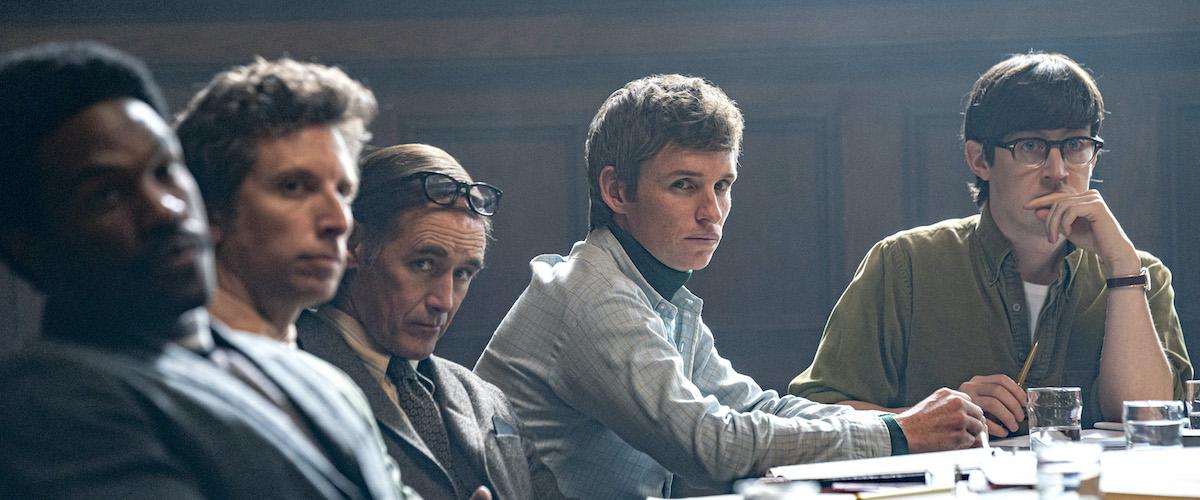“The whole world is watching!” the crowd chants outside as the defendants enter the courthouse. The highly-publicized trial of leading anti-war activists captivated and divided the nation at the height of the Vietnam War. Aaron Sorkin’s The Trial of the Chicago 7 is a snappy, at times clumsy, reenactment of the real-life trial of protestors charged with conspiracy and crossing state lines to incite riots in 1968 at the Democratic National Convention in Chicago.
Sorkin is able to combine the real with the ridiculous. For the most part, the film deals with a lot of serious stuff — war, peace, justice, racism and democracy — but also slips in some silliness. He assembled a star-studded cast that will make you say, “Woah, is that Borat?!” And yes, well, technically it is Sacha Baron Cohen playing the founding member of the Youth International Party (Yippie), Abbie Hoffman. He and Jeremy Strong, playing Jerry Rubin, are a large part of that aforementioned comedy. Cohen’s Hoffman characteristically opposes Eddie Redmayne’s Tom Hayden, the leader of the Students for a Democratic Society (SDS). The rest of the cast includes Alex Sharp as Rennie Davis, the national organizer for the SDS, John Carroll Lynch as David Dellinger, the leader of the National Mobilization Committee to End the War in Vietnam (MOBE), Noah Robbins as Lee Weiner and Daniel Flaherty as John Froines.
Although the defendants all stand together in opposition of the war and the need for a greater democracy, they disagree on the tactics and style with which to achieve these goals. The rift between these smart guys is a driving force for the plot, which gives it momentum.
For as much praise as I am giving Sorkin, I do have some criticisms. With such a great cast, it feels like some members do not get enough time to shine on their own. Some characters are relegated to the background, chiming in only every now and then. Another thing, why is the cast so white? Yes, this is based on real-life events, but if that is the excuse, it should be noted that Sorkin took many liberties in dramatizing these events. Since he had already decided to fictionalize certain aspects including a more diverse cast could have been part of those decisions. The one non-white actor is Yahya Abdul-Mateen II. Abdul-Mateen plays Bobby Seale, the national chairman of the Black Panther Party. Seale was in Chicago to give a speech and, although he was only there for a few hours, was still arrested with the rest of the group. This made him the eighth defendant but not one of the Chicago 7. Because his lawyer was sick in California, Seale is left with no representation, repeatedly asking for a mistrial. In the film, he even states that he was placed in this trial to make the group appear “scarier.”
While Sorkin’s Chicago 7 can feel overly ambitious and clumsy, it is not a film that can be ignored. It resonates with the times. There is no more poignant time to release this type of movie than now. With Black Lives Matter protests occurring in most major cities, we see their similarities to the protests of the Vietnam War. The same injustice suffered by the defendants then is what we are suffering through now. The idea of Seale getting beaten and gagged by police officers (yes, this really happened) seems less surprising as we see Black Americans getting shot and killed by police officers to this day. Rifts between organization leaders parallel rifts we see among movement followers. Within the film, Seale points out, “Martin’s dead. Malcolm’s dead. Medgar’s dead. Bobby’s dead, Jesus is dead,” referring to how all those leaders that advocated for peaceful protests are dead, and how now is the time to try new and more radical approaches. What people chose then and what people choose now must be thought of with the notion that the whole world is watching.





